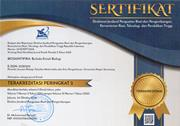Genetic Parameters of Agronomic Traits in Sweetpotato Accessions
(1) Indonesian Legumes and Tuber Crops Research Institute
(2) Indonesian Legumes and Tuber Crops Research Institute
(3) Indonesian Legumes and Tuber Crops Research Institute
(4) Indonesian Legumes and Tuber Crops Research Institute
Abstract
Germplasm as a source of genes in sweetpotato breeding requires information on appearance and genetic parameters. The objectives of this research were to determine the performance and genetic parameters of sweet potato accessions. The research was conducted at Kendalpayak Research Station, Malang, East Java, Indonesia. The materials used were thirty sweet potato accessions from Indonesian Legumes and Tuber Crops Research Institute (ILETRI) germplasm collection. The research was arranged in a Randomized Block Design (RBD) with two replications. The variables observed included: the vines length, the weight of vines, the number and weight of the saleable root per plot, the number and weight of the non-saleable root per plot, the number and weight of root per plant, the root yield, the harvest index, and the dry matter content. The results of ANOVA showed a significant difference among the tested genotypes in almost all traits observed except on weight of non-saleable root. PCV estimation was higher than GCV estimation for all the observed characters. The weight of the saleable root per plot, the weight of root per plant, and the root yield that showed a wide range of PCV and GCV as well as high broad-sense heritability indicated that these traits had additive gene effect and more reliable for effective selection. The broad GCV in a population is effective for selection to obtain the superior variety.
Keywords
Full Text:
PDFReferences
Addisu F., Yohannes P., & Habtamu Z. (2013). Genetic variability and association between agronomic characters in some potato (Solanum tuberosum L.) genotypes in SNNPRS, Ethiopia. International Journal of Biodiversity and Conservation, 5(8), 523-528.
Afuape S.O., Nwankwo I.I.M., Omodamiro R.A., Njoku J.C., Ogbonna C.L., & Uzuegbu D.C. (2015). Targeted Breeding for Sweetpotato-Based Enterprises: Variability, Genotype-by-Environment Interaction, Heritability and Correlation Studies of Important Sweetpotato Root Processing Quality Traits. Int. J. Plant Breed. Genet., 9 (4), 206-217,
Akinwale M.G., Akinyele B.O., Dixon A.G.O., & Odiyi A.C. (2010). Genetic variability among forty-three cassava genotypes in three agro-ecological zones of Nigeria. Journal of Plant Breeding and Crop Science, 5, 104-109.
Baafi E., Ofori K., Blay E.T., Gracen V.E., Manu-Aduening J., & Carey E.E. (2016). Exploitation of Genetic Potential of Sweetpotato for End-User Traits Improvement. African Crop Science Journal, 24(4), 377 – 387.
Badu M., Ashok P., Kiran Patro T.S.K.K., & Sasikala K. (2017). Studies on Genetic Variability, Heritability and Genetic Advance for Growth, Yield and Quality Parameters among Orange Flesh Sweet Potato [Ipomoea batatas (L.) Lam.] Genotypes. Int.J.Curr.Microbiol.App.Sci, 6(9), 1894-1903
Chahal G.S. & Gosal S.S. (2010). Principles and Procedures of Plant Breeding: Biotechnology and Conventional Approaches. New Delhi, Chennai, Mumbai and Kolkata, Narosa Publishing House.
Demelie M. & Aragaw A. (2016). Genetic variability of Sweet Potato on yield and yield related traits at werer Agricultural Research Center. Ethiopia. Electronic Journal of Plant Breeding, 362-370.
Dewi R., Utomo S.D., Kamal M., Timotiwu P.B., & Nurdjanah S. (2019). Genetic and phenotypic diversity, heritability, and correlation between the quantitative characters on 30 sweet potato germplasms in Lampung, Indonesia. Biodiversitas, 20(2), 380-386.
EL-Sharkawy G.A. (2019). Assessment of Variability, Correlation and Response to Selection in Four Cultivars of Sweet Potato "Ipomoea batatas, L." under Alexandria Environmental Condition. Alex. J. Agric. Sci., 64(1), 21-31.
Irwan M., Rosmayati., Hanafiah D.S., Rahmawati N. & Bakti D. (2019). Analysis of changes in morphological characteristics of leaves and stems in some sweet potato cultivars (Ipomoea batatas L.) from Simalungun and Dairi highlands planting in the lowlands. IOP Conf. Series: Earth and Environmental Science 260 (2019) 012150 IOP Publishing,
Kuswantoro H., Artari R., Rahajeng W., Ginting E., & Supeno A. (2018). Genetic Variability, Heritability, and Correlation of Some Agronomical Characters of Soybean Varieties. Biosaintifika, 10(1), 9-15.
Kathabwalika D.M., Chilembwe E.H.C., Mwale V.M., Kambewa D., & Njoloma J.P. (2013). Plant growth and yield stability of orange fleshed sweet potato (Ipomoea batatas) genotypes in three agro-ecological zones of Malawi. Int. Res. J. Agric. Sci. Soil Sci., 3(11), 383-39.
Madawal S.L., Alloli, Madarkhandi T.B.S., & Narasannavar A. (2015). Genetic variability study in sweet potato (Ipomoea batatasL.) genotypes. Inte. J. of Tropical Agric., 33(2), 274-282.
Mbah E.U. & Eke-Okoro O. (2015). Relationship Between some Growth Parameters, Dry Matter Content and Yield of Some Sweet Potato Genotypes Grown under Rainfed Weathered Ultisols in the Humid Tropics. Journal of Agronomy, 14(3), 121-129.
Narasimhamurthy P.N., Patel N.B., Patel A.I. & Koteswara Rao G. (2018). Genetic variability, heritability and genetic advance for growth, yield and quality parameters among sweet potato [Ipomoea batatas (L.) lam.] genotypes. International Journal of Chemical Studies, 6(4), 2410-2413.
Ngailo S., Shimelis H., Sibiya J., Amelework B., & Mtunda K. (2016). Genetic diversity assessment of Tanzanian sweetpotato genotypes using simple sequence repeat markers. South African Journal of Botany, 102, 40-45
Palumbo F., Galvao A.C., Nicoletto C., Sambo P., & Barcaccia G. (2019). Diversity Analysis of Sweet Potato Genetic Resources Using Morphological and Qualitative Traits and Molecular Markers. Genes,10(840), 19 pages.
Pradhan D.M.P., Mukherjee A., George J., Chakrabarti S.K.,Vimala B., Naskar S.K., Sahoo B.K., & Samal S. (2015). High starch, beta carotene and anthocyanin rich sweet potato: ascent to future food and nutrition security in coastal and backward areas. Intl J Trop Agric, 33(2), 397-400 (Part I).
Rahajeng W. & Rahayuningsih S.A. (2016). Potensi Genetik Klon-Klon Ubijalar Berdasarkan Karakter Agronomi. Prosiding Seminar Nasional Hasil Penelitian Tanaman Aneka Kacang dan Umbi Tahun 2015, 588-595.
Rahajeng W. & Indiati S.W. (2018). Keragaan Karakter Agronomi dan Parameter Genetik Aksesi Ubi Jalar serta Toleransinya terhadap Hama Boleng. Buletin Palawija,16(1),1-8.
Rukundo P., Shimelis H., Laing M., & Gahakwa D. (2013). Storage root formation, dry matter synthesis, accumulation and genetics in sweet potato. AJCS, 13, 2054–2061.
Selaocoe M.E., Adebola P., Pillay M., & Laurie M. (2019). Genetic diversity of South African sweetpotato germplasm using molecular markers. Journal of Crop Improvement, 33(6), 814-833.
Shaumi U., Chandria W., Waluyo B., & Karuniawan A. (2012). Potensi genetik ubijalar unggulan hasil pemuliaan tanaman berdasarkan karakter morfoagronomi. Prosiding Seminar Hasil Penelitian Tanaman Aneka Kacang dan Umbi 2011.
Sharavati M.B., Srinivasa V., Anusha R.B., & Shubha A.S. (2018). Genetic Variability Studies in Sweet Potato (Ipomoea batatas (L.) Lam) Genotypes under Hill Zone of Karnataka, India. Int.J.Curr.Microbiol.App.Sci., 7(9), 850-858
Shumbusha D., Shimelis H., Laing M., & Rukundo P. (2019). Gene action and heritability of yield components of dual-purpose sweetpotato clones. Euphytica, 215:122.
Syukur M., Sujiprihati S., & Yunianti R., (2009). Teknik Pemuliaan Tanaman. Departemen Agronomi dan Hortikultura, Fakultas Pertanian, Institut Pertanian Bogor.
Wera B., Yalu A., Ramakrishna A., & Deros M. (2014). Genotypic Variability Estimates Of Agronomic Traits For Selection In A Sweetpotato (Ipomoea batatas) Polycross Population In Papua New Guinea. J. Plant Breed. Genet., 02(03), 131-136.
Refbacks
- There are currently no refbacks.

This work is licensed under a Creative Commons Attribution 4.0 International License.


